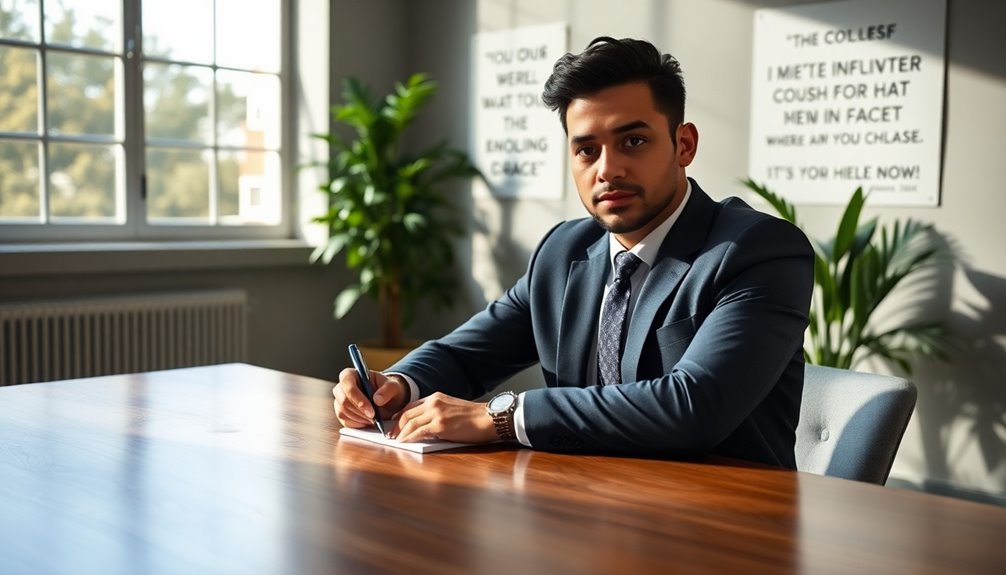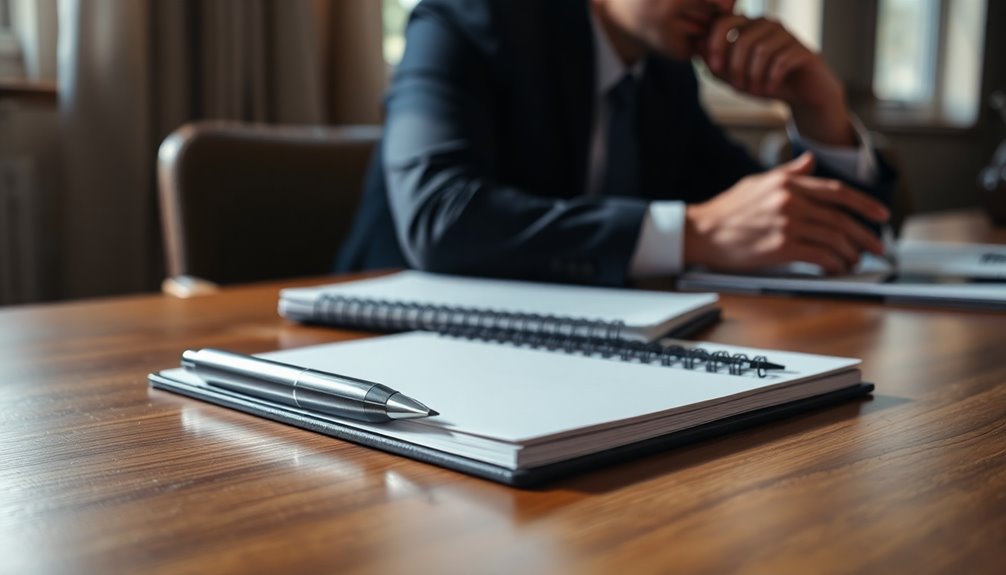To master hypothetical interview questions with confidence, focus on demonstrating your problem-solving skills and thought processes. Start by structuring your answers clearly: state the issue and outline your solution. Use specific examples from your past to illustrate how you've tackled similar challenges. Align your responses with the company's core values to show your suitability. Don't hesitate to ask for clarification if needed; it shows your curiosity and willingness to engage. Finally, keep your answers concise and relevant to leave a strong impression. There's plenty more to explore that can boost your interviewing skills further.
Key Takeaways
- Understand the purpose of hypothetical questions to showcase problem-solving skills and thought processes relevant to workplace scenarios.
- Structure your responses clearly by stating the problem first, then outlining your solution.
- Use specific examples from past experiences to illustrate your thought process and problem-solving abilities.
- Align your answers with the company's core values to demonstrate your fit within the organizational culture.
- Practice active listening by asking for clarification to ensure your responses address the question effectively.
Understanding Hypothetical Questions

Hypothetical questions are a powerful tool in interviews, designed to evaluate how you approach real-world challenges. They test your skill level in various workplace scenarios and assess your problem-solving abilities.
When faced with these questions, you'll reveal your thought processes and assumptions, giving interviewers insight into your attitude towards tackling problems. These questions often gauge your curiosity and ability to follow up with additional inquiries.
As you respond, remember that your answers should reflect your core values and ethics, showcasing your commitment to collaboration and teamwork. Understanding the intent behind these questions can help you prepare effectively, allowing you to demonstrate your critical thinking and decision-making skills in a compelling way.
Benefits of Hypothetical Scenarios

When you engage with hypothetical scenarios during an interview, you tap into a valuable opportunity to showcase your problem-solving skills and thought processes.
These questions push you to think critically and demonstrate how you approach complex situations. By maneuvering through hypothetical challenges, you illustrate your ability to analyze problems and devise practical solutions. This not only highlights your cognitive skills but also shows your creativity in handling unusual circumstances.
Additionally, hypothetical scenarios allow you to demonstrate your collaboration and adaptability by discussing how you'd work with others to achieve goals.
Ultimately, these questions provide a platform for you to express your unique approach to challenges, giving the interviewer insight into your potential contributions to the team.
Core Values and Ethics

Core values and ethics play a crucial role in shaping how you navigate workplace challenges and make decisions. When faced with hypothetical interview questions, your responses should reflect your core beliefs and ethical standards. These principles guide your judgment and behavior, helping interviewers gauge your alignment with their organization's values.
Consider how your values influence your problem-solving approach, especially in ethical dilemmas or conflicts. For example, if asked about handling a difficult coworker, demonstrate your commitment to respect and collaboration.
Highlighting your core values not only showcases your character but also provides insight into how you'll contribute to the company culture. Ultimately, staying true to your values will enhance your credibility and make your answers more authentic.
Importance of Collaboration

Collaboration considerably enhances your effectiveness in the workplace, complementing the core values and ethics that guide your decision-making.
When you work together with others, you generate innovative ideas and solutions that often surpass what any individual can achieve alone. Building strong relationships fosters trust and open communication, which are essential for maneuvering challenges.
By sharing diverse perspectives, you can address problems more thoroughly, leading to better outcomes. Furthermore, demonstrating collaboration skills shows potential employers that you can work towards mutual goals, adapt to different working styles, and contribute positively to team dynamics.
Ultimately, your ability to collaborate not only reflects your interpersonal skills but also your commitment to a cohesive and productive work environment. Additionally, effective collaboration can enhance stress management techniques, which are essential for maintaining a healthy team dynamic during high-pressure situations.
Strategies for Effective Responses

To effectively respond to hypothetical interview questions, it's crucial to structure your answers with clarity and purpose. Start by clearly stating the problem, then outline the solution you'd implement, highlighting its benefits.
Use specific examples from your past experiences to illustrate your points, ensuring they relate to the question at hand. This not only showcases your problem-solving skills but also demonstrates your ability to think critically.
Don't hesitate to ask for clarification if a question isn't clear; this shows engagement and helps you provide a more focused response.
Finally, make sure your answers align with the company's core values, reinforcing your suitability for the role. Remember, concise and relevant responses leave a lasting impression. Additionally, consider how your approach reflects principles of personal finance management, as this can demonstrate your ability to make informed decisions under pressure.
Common Interview Scenarios

When preparing for interviews, candidates often encounter various common scenarios that test their problem-solving skills and adaptability. These situations might involve managing a heavy workload, addressing conflicts with coworkers, or prioritizing tasks under pressure.
You may be asked how you'd handle a difficult client or navigate a project with tight deadlines. Expect questions about making critical decisions when faced with limited information or resolving team disagreements.
Think about your past experiences and how they relate to these scenarios. Reflect on specific examples that demonstrate your ability to think critically, collaborate effectively, and overcome challenges. Additionally, consider how open communication can be a vital tool in resolving team disagreements and fostering collaboration.
Managing Time During Interviews

Managing time effectively during interviews is essential to ensuring you can address all questions thoroughly while keeping the conversation engaging.
Start by familiarizing yourself with common hypothetical questions, so you can formulate concise responses. Practice your answers to maintain clarity and avoid rambling.
If a question requires a lengthy explanation, prioritize the most relevant details to keep your response focused. Be mindful of the interviewer's cues; if they seem rushed, adjust your answers accordingly.
It's also helpful to pause and ask if they'd like more detail, which shows your awareness of time. Incorporating techniques from effective relaxation techniques can help you stay calm and composed during the interview.
Ultimately, remember to leave room for follow-up questions, ensuring an interactive and dynamic discussion without overrunning the allocated time.
Enhancing Answer Authenticity

Enhancing answer authenticity is essential for making a strong impression during hypothetical interviews. To achieve this, focus on sharing real-life experiences that align with the scenarios presented. Instead of fabricating responses, draw from your past situations where you've faced similar challenges. This approach not only showcases your problem-solving skills but also reflects your core values.
Be specific in your examples, detailing the situation, your role, and the outcome. This clarity will help interviewers gauge your true capabilities. Additionally, consider the impact of financial stability on your decision-making process, as it can influence both personal and professional choices.
Frequently Asked Questions
How Do I Prepare for Hypothetical Interview Questions?
To prepare for hypothetical interview questions, start by reviewing common scenarios related to your field.
Think about past experiences where you solved problems or collaborated effectively.
Practice structuring your answers clearly, stating the problem, solution, and outcome.
Use specific examples to illustrate your points.
Don't hesitate to ask for clarification during the interview if a question isn't clear.
This shows engagement and allows you to provide more relevant responses.
What Industries Commonly Use Hypothetical Interview Questions?
Imagine sailing through a sea of opportunities, where the winds of hypothetical questions guide your journey.
You'll find that industries like healthcare, finance, and technology often use these questions. They're looking for your ability to navigate complex scenarios and make quick decisions.
Education and customer service also rely on them, testing your problem-solving skills and adaptability.
Embrace these challenges, as they reveal your potential to thrive in diverse environments.
Can Hypothetical Questions Assess Technical Skills Effectively?
Hypothetical questions can assess technical skills, but their effectiveness varies.
You'll need to demonstrate your problem-solving abilities through structured responses. While these questions reveal your thought process, they mightn't fully capture your hands-on technical expertise.
It's essential to relate your experiences to the scenarios presented. By doing so, you'll show how you apply your technical knowledge in practical situations, giving interviewers a clearer picture of your capabilities.
How Should I Follow up After the Interview?
After the interview, you should follow up like a hawk swooping down on its prey.
Send a thank-you email within 24 hours, expressing your appreciation for the opportunity. Mention specific points from the conversation that resonated with you, reinforcing your interest in the role.
If you don't hear back within a week or two, it's okay to send a polite follow-up, reiterating your enthusiasm and inquiring about the next steps.
What if I Struggle to Answer a Hypothetical Question?
If you struggle to answer a hypothetical question, take a moment to breathe and collect your thoughts.
It's okay to ask for clarification or to repeat the question.
Break it down into manageable parts, focusing on the problem and potential solutions.
You can also draw on past experiences that relate to the scenario.
Conclusion
In the domain of interviews, hypothetical questions act like a mirror, reflecting your problem-solving skills, adaptability, and core values. Embrace these moments to showcase your unique professional ethos, much like a sculptor chiseling away at stone to reveal a masterpiece. By preparing and practicing, you can transform these challenges into opportunities that shine. Remember, each response you give is a brushstroke, painting a vivid picture of who you are and how you can contribute to the company's vision.









